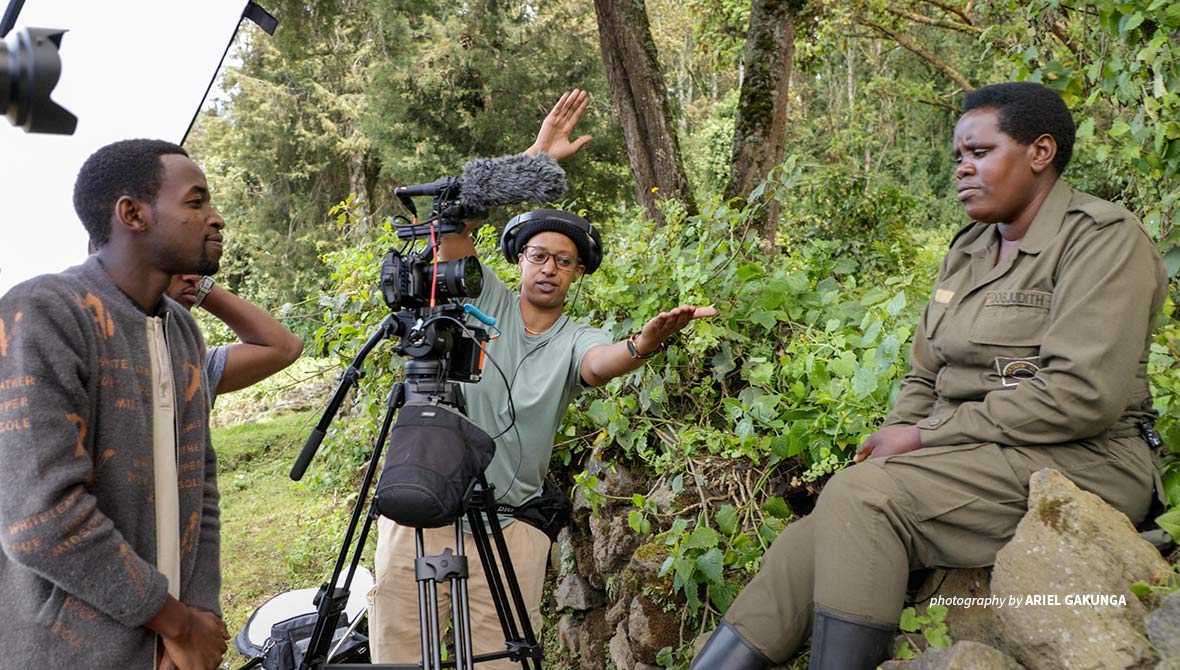Africa’s filmmakers are changing the conservation narrative

African Conservation Voices fellows filming in Rwanda's Volcanoes National Park
The responsibility of the storyteller is to relay the full picture. When it comes to conservation, the full picture encompasses the complex interplay between natural resource management, human wellbeing, trade, ecosystem degradation, wildlife extinction, and climate breakdown.
For too long, international and local media have viewed conservation issues from a Western perspective. But bringing conservation to the foreground requires a mindset shift as well as investment in media practice so that storytellers on the ground shift the narrative and showcase complexity of biodiversity on all aspects of interdependence with our existence.
Without local ownership at every level — from research and production to distribution — media about Africa cannot capture the reality of those on the ground nor will it connect with the millions of people on the continent who experience it. If we cannot flip the narrative now and make more people understand what is really at stake, the behavior change needed to solve conservation challenges will not happen soon enough.
Through the African Conservation (ACV) Media Labs, African Wildlife Foundation (AWF) is reversing this trend by providing specialized training to storytellers on the continent with the first cohorts coming from Kenya and Rwanda.
In partnership with Jackson Wild, AWF launched the program in March 2021 with a series of virtual workshop sessions in early 2021 which introduced the fellows to conservation models, challenges, and solutions, as well as various skills in research, production, and pitching their ideas. Working side-by-side with experienced filmmakers and conservation professionals, they shot six films in the Maasai Mara and Volcanoes National Park over May-June 2022.
All six films were premiered at the ongoing Jackson Wild Summit 2022 in Burgenland, Austria.
Bridging the divide between conservation and action
The ACV fellows from Kenya produced three films set in the country’s iconic Maasai Mara landscape. “The Last Hunt” is centered on the transformation of Moses, a tour guide at a Maasai Mara lodge who many years ago made ends meet by poaching wildlife and even served a prison sentence for his crime. “Agent of Change” explores how Mako, a respected Maasai elder came to accept wildlife conservation and pastoralism as compatible activities. “Saving the Vulture: One Man’s Quest” tells the story of a young scientist who rehabilitates vultures that are inadvertently poisoned in the Maasai Mara landscape.
Similarly in Rwanda, the fellows focused on telling people-centered stories about the country’s remarkable conservation successes. “Judith: Porter, Protector, Pioneer” showcases the first woman porter in Rwanda’s Volcanoes National Park who has broken boundaries to become a role model for her work protecting mountain gorillas. Also set in Volcanoes National Park, “Chasing the Golden Monkey” tells the story of a scientist who grew up near the protected area and has dedicated his life to studying golden monkeys. In “Weight of Water: The Story of Athenasie,” a young woman takes charge of a local project to help her community.
> Learn more about AWF's African Conservation Voices Media Labs